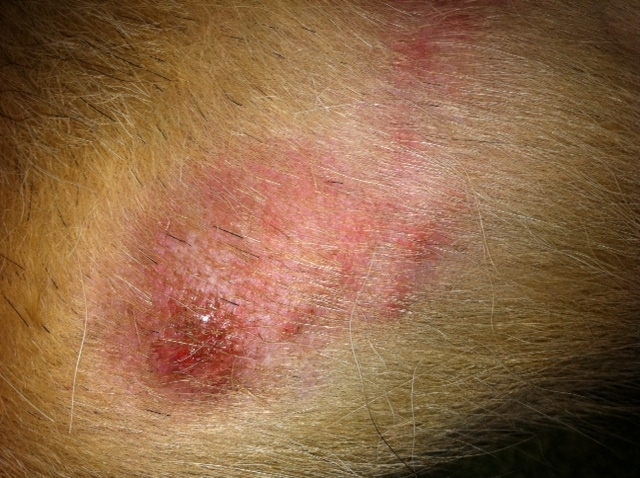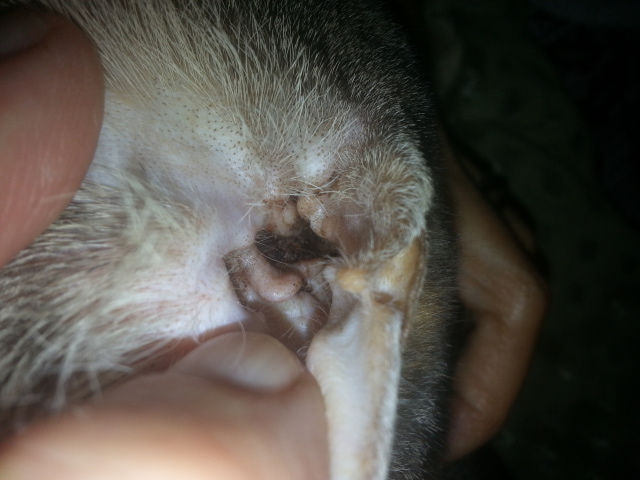QuestionJennifer,
My 15 year old cat has just been diagnosed with bladder cancer using an ultrasound. He has multiple tumors.
He also has something going on with his intestines that may be cancer or may be IBD.
Knowing what kind of cancer is in the bladder as well as whether the intestinal problem is cancer or not, is essential to deciding how treatment should proceed.
I have been told that a biopsy is the only way to do this and have decided that it's probably too much to put my poor old cat through.
So here are my quesions, if you wouldn't mind taking a little time to help me fully understand things:
1. I hear there is a test by Abbott Labs that will diagnose trans cell carcinoma from a urine sample. I mentioned it to the vet and she said that blood in the urine messes up the results and since my cat always has blood in his urine from the tumors, the test won't help. Do you know for sure that she was thinking of the Abbott test? Also, what good is a test to determine the type of bladder cancer if the main symptom of bladder cancer renders it ineffective? This was very confusing to me.
2. My cat has been having intestinal problems for many many years, with no new changes in his symptoms for at least a year or two. Changing his diet made a huge difference and Flagyl has always been helpful. Is this enough evidence that it's probably IBD and not cancer?
3. I'm tempted to say that since it's 99% likely it's trans cell and it's pretty likely he's got IBD, that we should just cross our fingers and give him Piroxicam. That's the only thing that sounds like it will increase his time here without too much likelihood of decreasing his quality of life. Is this a reasonable way of thinking about this? The vet says that without a biopsy she'd probably put him on Prednisone, and I really don't like the idea of treating him with that unless we know for sure it's the best option. (I had a dog on Prednisone and he had a lot of side effects.)
4. Do you know of any alternative therapies or supplements that have been beneficial to cats with bladder cancer?
Sorry for such a long question! I have a wonderful vet, but I just feel like I need a second opinion and some more information before I decide what's best for Domino. Thank you so much for being willing to help people like me with this stuff!
Lynn
AnswerHello,
Most bladder cancers are Transitional Cell Carcinomas and there is not a whole lot of treatment options. Depending on what the tumors look like, surgery to debulk the tumors MAY help, plus then you could get a biopsy and a definitive diagnosis.
I was under the impression that the urine test was for dogs only, but you would have to call the company to find out for sure.
There is a fine line between IBD and intestinal Lymphoma. IBD does usually repsond to diet change and flagyl; however, some cases are treated with steroid (prednisone) as well. Treatment of lymphoma involves a regimen of chemotherapy and prednisone as well.
Prednisone will most likely not doing anything for the bladder cancer.
PIROXICAM is widely used for bladder cancer as it is a NON-steroidal anti-inflammatory that has benefits in bladder cancer patients. It can not, howevever, be given with any other type of steroid or non-steroidal medication and kidney function must be normal. I would try that versus the prednisone.
Giving your cat anti-oxidants and vitamin supplements would certainly be beneficial. There are some herbal formulas that are made to help reduce bladder inflammation such as Tinkle Tonic, which may help keep him more comfortable. Transfer Factor is an immune-boosting supplement that helps increase Natural Killer Cell activity and has been touted to help shrink some cancers (when given in large doses). It wouldn't hurt and could be given with any other medication. www.trasferfactor.com There is a Feline Complete product that is an all-in-one supplement; however, giving the human capsules may be better.
Best wishes,
Dr. Jennifer L. Fry
www.my4life.com/drfry
www.antietamvet.com

 German Shepard Skin Problem
Question
Max
Hi, My 6 year old male German Shepa
German Shepard Skin Problem
Question
Max
Hi, My 6 year old male German Shepa
 pancreatitis/lymphoma
Question
Romeo
Hello. I have a 9 year old Siames
pancreatitis/lymphoma
Question
Romeo
Hello. I have a 9 year old Siames
 cat ear problems
Question
Cats ear
I think our cat has an ear pro
cat ear problems
Question
Cats ear
I think our cat has an ear pro
 Dog Mange
Question
Mange Mange 2
Hello!
I have a qu
Dog Mange
Question
Mange Mange 2
Hello!
I have a qu
 My puppy still wont eat regularly.
QuestionI have an 11 month old King Charles Cavalier (C
My puppy still wont eat regularly.
QuestionI have an 11 month old King Charles Cavalier (C